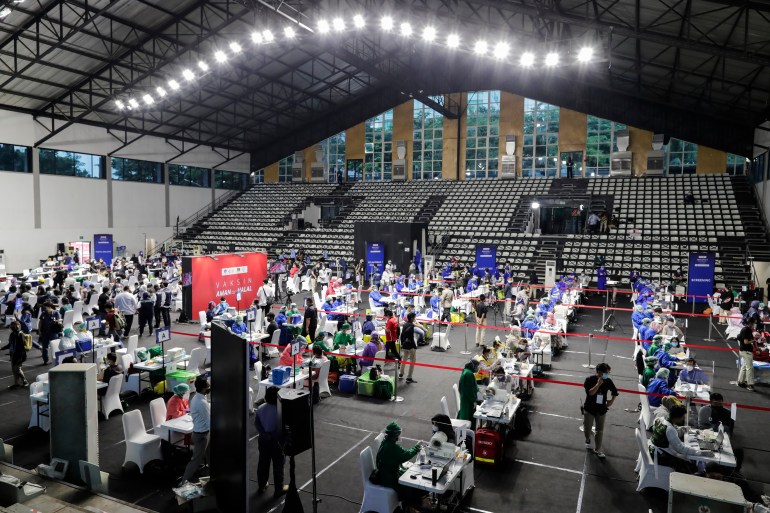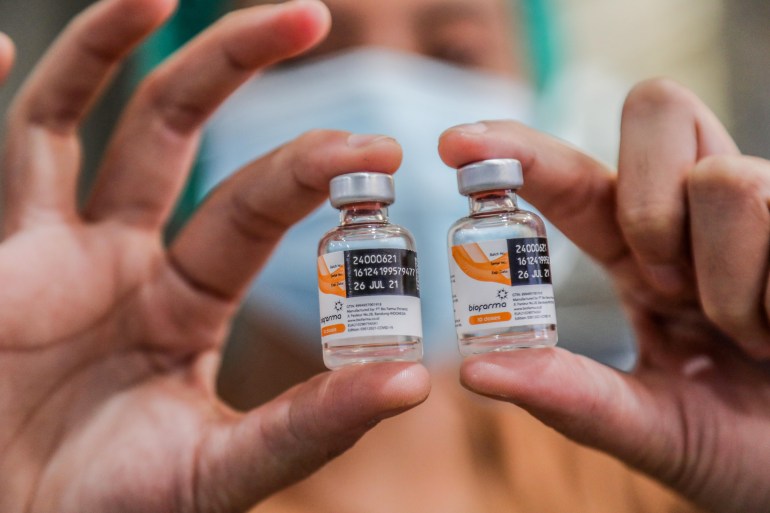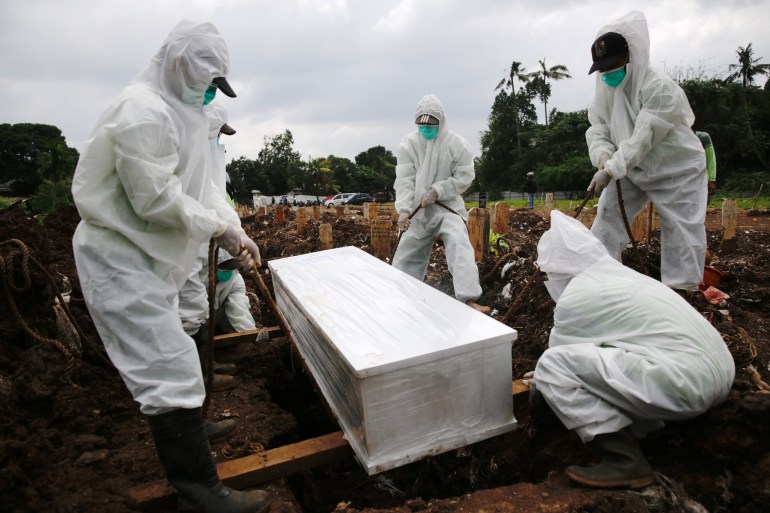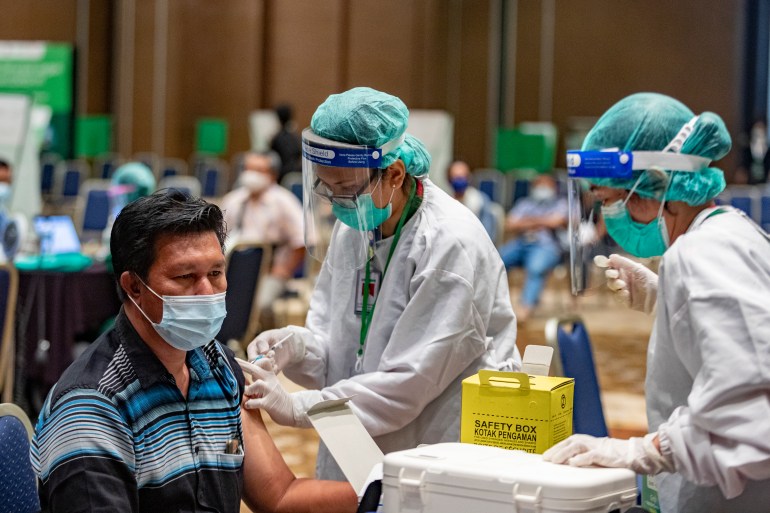Indonesia courts controversy with private COVID vaccine scheme
Health experts question government plan to allow private companies to import vaccines to ‘speed up’ effort to reach herd immunity.

Jakarta, Indonesia – The Indonesian government has approved a controversial new scheme that will allow cashed-up private companies in the developing Southeast Asian nation to pay to independently inoculate their staff from COVID-19 and avoid the long wait for public vaccination.
The country is aiming to vaccinate 181.5 million out of the 270 million population by 2021. But since the public rollout began on January 13, only one million people have been fully vaccinated with two doses, according to Our World in Data, an online resource tracking global COVID-19 vaccination releases. Nearly 2.7 million have had their first jab.
Keep reading
list of 4 itemsIndonesia: Doctors reject patients as COVID cases top one million
Young people first: Indonesia’s COVID vaccine strategy questioned
Indonesia aims for halal ruling before COVID vaccine roll out
“The reason we are doing this is to speed up herd immunity in Indonesia,” Ministry of Health spokesperson Dr Nadia Wikeko told Al Jazeera.
She says the scheme, which has already attracted 7,000 company members, “will not leave the poor people behind because private-sector vaccines will be sourced from ‘Gotong Royong’,” – a new vaccine bank meaning Mutual Cooperation in the Indonesian language.
Gotong Royong will be administered by Bio Farma, Indonesia’s only vaccine maker.
“The cost of these vaccines will be borne by private companies that place orders. It’s an additional part of the solution,” she said.
Given global supply constraints, companies may offer a premium on the price in order to secure supplies, experts said. Bambang Heriyanto, a spokesperson for Bio Farma, said it was not clear when the vaccines would be imported into Indonesia but talks were continuing with both Moderna and Sinopharm.

Most medical experts and epidemiologists in Indonesia are opposed to the plan.
“If the private sector wants to help out, they should import vaccines and give them to healthcare workers and the elderly who are clearly more at risk than anyone else,” said Ahmad Utomo, a molecular biological consultant in Jakarta specialising in the diagnosis of lung infections. “Or they could give them to the parents of their employees because most young workers in Indonesia live with their parents and have a much lower COVID-19 mortality rate. But this is a political decision, not a scientific one.”
Dr Dicky Budiman, an epidemiologist who helped formulate Indonesia’s strategic response to pandemics for 20 years, says there are inherently high risks of involving the private sector in large vaccination plans.
“A vaccine is a public good. It should not have any economic value because the laws of economics – supply and demand – will prevail,” he said. “We know there is huge demand for the vaccine and that will introduce the possibility of counterfeit vaccines and unqualified distributions of vaccines.”
Ethical concerns
Indonesia has endured the worst coronavirus outbreak in Southeast Asia, recording nearly 1.35 million cases of COVID-19 and nearly 36,000 deaths since the first cases emerged last year.
The government has steered clear of strict lockdowns to curb the spread of the disease, fearing the effect on the country’s poor and is banking on vaccines to bring the crisis to an end.
The first phase of its vaccine release for 1.3 million healthcare is complete. The second phase, aimed at38.5 million citizens, including nearly 17 million people in the public sector and nearly 22 million older people has been delayed because of inventory shortfalls.
Dr Budiman acknowledges the private sector can play a role in vaccinating the public but that its contribution should be based on science-driven policy.
“The main goal of vaccination is reducing mortality by protecting those at greater risk of mortality: healthcare workers, the elderly and essential workers,” he said. “But in this scheme, your qualification to be vaccinated relies on you being an employee of a company. It’s not a public health strategy. It’s an economic strategy.”
Dr Budiman adds the scheme also risks undermining social harmony.
“Despite the benefits of vaccinating more people, it is a form of discrimination,” he said. “Rumours of first-class citizens and second-class citizens will arise as soon as the scheme starts running.”

There are also concerns about the private sector’s ability to handle a public health programme such as a vaccination scheme. The list of the 7,000 corporate applicants has been kept confidential, although Jahja Setiaatmadja, the chief executive of Bank Central Asia (BCA), one of Indonesia’s biggest lenders, said in January, the bank would apply for the scheme.
“The fact that the government has formed this partnership with the private sector shows how seriously ill-equipped it is at vaccinating the public,” Dr Budiman said.
Fithra Faisal Hastiadi, an economist at the University of Indonesia and spokesperson for the Ministry of Trade denies the scheme signals the government cannot meet its vaccination goals.
“The idea did not come from the government,” he said. “It was introduced by the Indonesian Chamber of Commerce and the government was quite reluctant to accept it at first because whenever you bring the private sector into healthcare, you get this kind of critique.”
He says the scheme will be tightly regulated to prevent the emergence of a black market for COVID-19 vaccines.
“Right now we have a very limited number of vaccines in Indonesia,” he said. “This is just a way for the private sector to help the government because it has the money to import more vaccines into the country. It’s not like if you are wealthy you can get vaccines because the companies that buy them must give to their employees and families for free”.
He adds: “Of course the companies that sign up will help themselves too because if they wait for the public rollout it will take more time to inoculate their employees. So it’s a market solution in one sense but a rational one. The government will retain tight control.”
Programme amended
Andreas Harsono of Human Rights Watch Indonesia was originally critical of the scheme when it was floated in January, claiming the poor would be trampled in the stampede for vaccines.
But now his office has given the proposal the green light.
“They changed the rules, disallowing private firms to buy vaccines from the government supply, meaning that they should import themselves. That means that the private firms will not compete with the poor in getting the vaccines,” he said.

Wiku Adisasmito, the spokesperson for Indonesia’s COVID-19 Task Force, says observers should “be careful when making comparisons because every country has different demographics and geography, and the solution for every country will be different”. He adds: “And let’s be clear: no one will have to pay to be vaccinated. Every dose will be free.”
Indonesia is not the only Asian country to have struck a deal with the private sector to accelerate its vaccination process.
India, which shares similarly challenging demographic, topographical, social and fiscal restraints to Indonesia, with only 0.2 per cent of its enormous population fully vaccinated, has signed a deal with private hospitals to assist in the second phase of its vaccination drive.
But with only 10,000 public vaccination centres in the country and 20,000 private hospitals joining the scheme, the latter will soon outnumber public centres by two to one, according to local media.
And while vaccines will be free at crowded government centres where elderly candidates have had to queue all day to be served, private hospitals will charge 300 to 400 Indonesian rupiah, approximately $5 a shot.
In Thailand’s resort island of Phuket, where 80 percent of tourism-related businesses have folded, some of those that survived have already acquired Oxford-AstraZeneca and Sinovac vaccines, the only COVID-19 vaccines approved in the country, according to the South China Morning Post newspaper.
Officials in Phuket are also planning to buy 600,000 doses – in a separate deal to those already bought by Bangkok – to achieve herd immunity and reopen the island to international tourists as early as October.
In Bali, Udayana University Professor of Virology Gusti Ngurah Mahardika is urging public and private stakeholders to do the same thing.

He says $200m is all that is needed to acquire the six million doses required to inoculate 70 percent of the population and reach herd immunity. The figure, he calculates, is equivalent to 5 percent of the $5.2bn in foreign exchange tourists in Bali contributed to the national economy in 2019.
“The biggest problem in Indonesia right now is the availability of vaccines because the government has limited financial capacity to buy the doses it needs to achieve herd immunity,” he said. “So if a private-public partnership allows more vaccines to be consumed in Indonesia, it’s a good thing, irrespective of who takes them.”